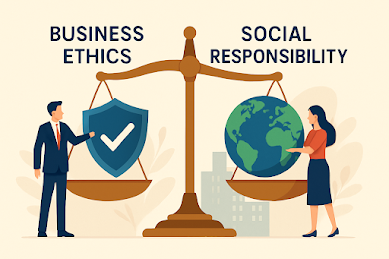The Importance of Business Ethics & Social Responsibility in Today’s Corporate World
Introduction
In an era where trust, transparency, and sustainability define the business landscape, ethics and social responsibility are more than buzzwords—they are essential principles. Companies that embrace ethical practices and give back to society not only earn customer loyalty but also build stronger brands and contribute to a better world.
What is Business Ethics?
Business ethics refers to the principles and values that guide behavior within the business environment. It ensures that companies operate in a fair, honest, and responsible manner. Ethical practices cover everything from employee treatment, marketing strategies, and customer interactions to financial integrity.
Key aspects of business ethics include:
-
Honesty and integrity in communication
-
Fair treatment of employees and stakeholders
-
Compliance with laws and regulations
-
Environmental consciousness and sustainability
-
Transparent financial reporting
What is Social Responsibility in Business?
Social responsibility is a company’s obligation to act in ways that benefit society. This includes initiatives like reducing carbon footprints, supporting community projects, ethical labor practices, and philanthropy. It goes beyond profit-making and focuses on positive social and environmental impact.
Why Business Ethics & Social Responsibility Matter
1. Builds Trust and Reputation
Companies that consistently act ethically and support social causes gain the trust of consumers, investors, and employees. This trust translates into long-term loyalty and a solid brand image.
2. Attracts and Retains Talent
Modern employees, especially millennials and Gen Z, prefer to work with organizations that reflect their values. Ethical practices and a responsible mission attract skilled and motivated professionals.
3. Ensures Compliance and Reduces Legal Risks
Ethical businesses are more likely to comply with laws and regulations, avoiding fines, lawsuits, or regulatory issues that can damage their reputation and finances.
4. Enhances Customer Loyalty
Customers are more likely to support brands that care about people and the planet. Ethical sourcing, transparent practices, and social initiatives influence buying decisions.
5. Drives Long-Term Profitability
While ethical practices may require investment, they often result in better financial performance over time. Responsible businesses experience fewer disruptions and enjoy more consistent support from stakeholders.
Real-Life Examples
-
Patagonia is known for its environmental activism and ethical sourcing, which has cultivated a loyal customer base.
-
Unilever runs numerous social impact programs while maintaining transparency and accountability, making it a global leader in sustainability.
How to Foster Ethics & Responsibility in Business
-
Create a code of ethics and ensure all employees are trained in it.
-
Encourage open communication and reporting of unethical behavior.
-
Partner with suppliers and vendors who align with your values.
-
Measure and report your social and environmental impact annually.
-
Support community projects, education, or environmental initiatives.
Conclusion
In today’s socially conscious market, businesses must go beyond profits. Ethical behavior and social responsibility are powerful tools that drive success, build trust, and make a positive impact on the world. By prioritizing these values, companies not only thrive but also inspire change.

Comments
Post a Comment